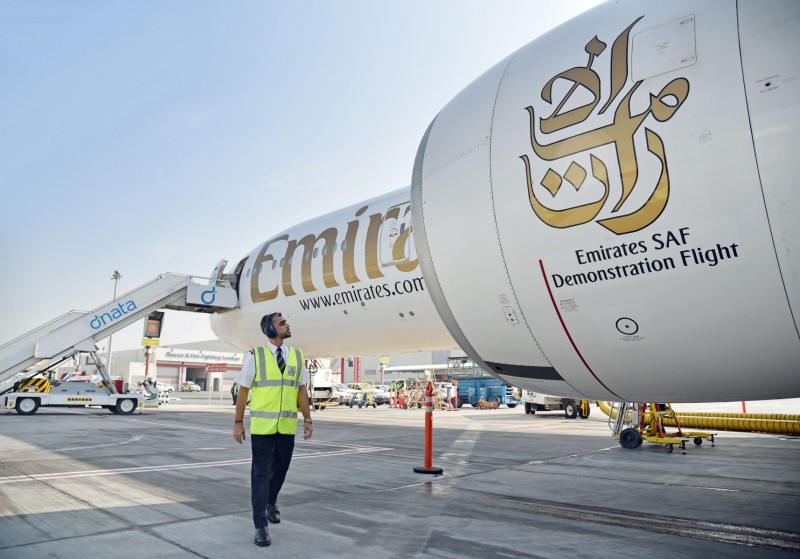Emirates, a leading global airline, is taking a significant stride towards a greener future by incorporating Sustainable Aviation Fuel (SAF) into its operations. This exciting development marks a major milestone in the airline’s commitment to environmental responsibility and sets a positive example for the industry.
A Partnership for Progress: Emirates and Neste Join Forces
In March 2024, Emirates activated a crucial fuel agreement with Neste at Amsterdam Schiphol Airport. This collaboration signifies a shared commitment to reducing emissions and paving the way for a more sustainable aviation industry. Here’s a breakdown of this collaborative effort:

Fueling Sustainability: Over 2 million gallons of blended SAF will be supplied to Amsterdam Schiphol Airport’s fueling system throughout 2024. This blended fuel represents a significant step towards cleaner skies.
Tracking Environmental Impact: Emirates employs industry-standard accounting methodologies to meticulously track the delivery of SAF into the fueling systems and its subsequent environmental benefits.
A Commitment to Volume: This partnership with Nestle represents one of the largest SAF purchases by Emirates to date, demonstrating their dedication to scaling up the use of sustainable alternatives.
Unveiling the Power of Neat SAF
Once fully integrated into Schiphol’s fueling system, the blended SAF will contain over 700,000 gallons of neat SAF. Here’s a closer look at the power of neat SAF:
Reduced Emissions: Neat SAF boasts the potential to reduce lifecycle carbon emissions by up to 80% compared to traditional jet fuel. This translates to a significant positive impact on the environment.
Seamless Integration: Fortunately, SAF integrates seamlessly with existing jet engines and airport fueling infrastructure. This eliminates the need for major infrastructure changes, facilitating a smoother transition towards sustainable aviation.
Expanding Sustainable Horizons
The partnership at Amsterdam Schiphol Airport is just one facet of Emirates’ comprehensive sustainability strategy. Here are some additional initiatives undertaken by the airline:
Global SAF Expansion: Emirates is actively working with Nestle to introduce SAF into the fueling systems at Singapore Changi Airport in the coming months, further expanding its sustainable footprint.
Industry Collaboration: Adel Al Redha, Emirates’ Deputy President and Chief Operations Officer, emphasizes the importance of collaboration. He highlights the value of working with committed partners like Nestle and airports like Schiphol to increase SAF accessibility across the airline’s network.
Industry Leaders Pave the Way
Both Emirates and Neste are at the forefront of the sustainable aviation movement. Leaders from both companies share their perspectives:
Emirates: A Sustainability Journey – Adel Al Redha emphasizes that the partnership with Neste is a crucial step in Emirates’ sustainability journey. He highlights the importance of strong partnerships in creating a foundation for a cleaner future in air travel.
Neste: Supporting Sustainability – Alexander Kueper, Vice President of Renewable Aviation at Neste, expresses his pride in supporting Emirates’ sustainability efforts. He applauds the airline’s adoption of Nestle MY Sustainable Aviation Fuel and views it as a positive example for the industry.
A Sustainable Future for Aviation
The use of SAF offers a promising path towards a more sustainable aviation industry. Here are some additional key points to consider:
Proven Performance: Emirates’ first flight powered by SAF blended with jet fuel took place back in 2017 from Chicago. This successful experience demonstrates the viability of SAF as a viable alternative fuel source.
Expanding Network: Emirates currently incorporates SAF into flights from Paris, Lyon, and Oslo, showcasing their commitment to integrating sustainable practices across their network.
Investing in the Future: In October 2023, Emirates became the first international carrier to join the Solent Cluster in the UK. This initiative focuses on low-carbon investments with the potential to create a large-scale SAF production plant.
Collaborative Efforts for a Greener Future
Emirates actively participates in numerous industry and UAE government working groups focused on advancing SAF production and availability. Here’s a glimpse into some of their collaborative efforts:
Scaling Up Production: Emirates works alongside stakeholders to encourage the scaling up of SAF production and supply, ensuring wider adoption throughout the industry.
UAE Power-to-Liquid Roadmap: The airline actively contributes to developing the UAE’s power-to-liquid (PtL) fuels roadmap. This roadmap aims to explore alternative fuel sources with lower environmental impact.
National Sustainable Aviation Fuel Roadmap: Emirates plays a vital role in the UAE’s National Sustainable Aviation Fuel Roadmap, which aspires to make the UAE a regional hub for alternative aviation fuels.
Air-CRAFT: A Collaborative Force for Change
Air-CRAFT, established by Emirates, brings together a diverse group of stakeholders dedicated to advancing SAF technologies. Here’s a breakdown of this vital consortium:
A Multifaceted Partnership: Air-CRAFT unites entities from various sectors, including aviation, government, regulatory bodies, academia, fuel producers, and manufacturers. This comprehensive approach ensures a holistic exploration of sustainable aviation solutions.
Focus on Innovation: The consortium’s primary objective is to develop, produce, and scale up cutting-edge SAF technologies. By fostering innovation, Air-CRAFT aims to accelerate the transition towards a more sustainable aviation industry.




